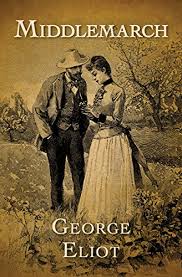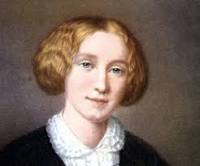Middlemarch Page #24
Middlemarch, A Study of Provincial Life is a novel by the English author George Eliot, appearing in eight instalments in 1871 and 1872. Set in a fictitious Midlands town from 1829 to 1832, it follows distinct, intersecting stories with many characters.
“What is your nephew going to do with himself, Casaubon?” said Mr. Brooke, as they went on. “My cousin, you mean—not my nephew.” “Yes, yes, cousin. But in the way of a career, you know.” “The answer to that question is painfully doubtful. On leaving Rugby he declined to go to an English university, where I would gladly have placed him, and chose what I must consider the anomalous course of studying at Heidelberg. And now he wants to go abroad again, without any special object, save the vague purpose of what he calls culture, preparation for he knows not what. He declines to choose a profession.” “He has no means but what you furnish, I suppose.” “I have always given him and his friends reason to understand that I would furnish in moderation what was necessary for providing him with a scholarly education, and launching him respectably. I am therefore bound to fulfil the expectation so raised,” said Mr. Casaubon, putting his conduct in the light of mere rectitude: a trait of delicacy which Dorothea noticed with admiration. “He has a thirst for travelling; perhaps he may turn out a Bruce or a Mungo Park,” said Mr. Brooke. “I had a notion of that myself at one time.” “No, he has no bent towards exploration, or the enlargement of our geognosis: that would be a special purpose which I could recognize with some approbation, though without felicitating him on a career which so often ends in premature and violent death. But so far is he from having any desire for a more accurate knowledge of the earth’s surface, that he said he should prefer not to know the sources of the Nile, and that there should be some unknown regions preserved as hunting grounds for the poetic imagination.” “Well, there is something in that, you know,” said Mr. Brooke, who had certainly an impartial mind. “It is, I fear, nothing more than a part of his general inaccuracy and indisposition to thoroughness of all kinds, which would be a bad augury for him in any profession, civil or sacred, even were he so far submissive to ordinary rule as to choose one.” “Perhaps he has conscientious scruples founded on his own unfitness,” said Dorothea, who was interesting herself in finding a favorable explanation. “Because the law and medicine should be very serious professions to undertake, should they not? People’s lives and fortunes depend on them.” “Doubtless; but I fear that my young relative Will Ladislaw is chiefly determined in his aversion to these callings by a dislike to steady application, and to that kind of acquirement which is needful instrumentally, but is not charming or immediately inviting to self-indulgent taste. I have insisted to him on what Aristotle has stated with admirable brevity, that for the achievement of any work regarded as an end there must be a prior exercise of many energies or acquired facilities of a secondary order, demanding patience. I have pointed to my own manuscript volumes, which represent the toil of years preparatory to a work not yet accomplished. But in vain. To careful reasoning of this kind he replies by calling himself Pegasus, and every form of prescribed work ‘harness.’” Celia laughed. She was surprised to find that Mr. Casaubon could say something quite amusing. “Well, you know, he may turn out a Byron, a Chatterton, a Churchill—that sort of thing—there’s no telling,” said Mr. Brooke. “Shall you let him go to Italy, or wherever else he wants to go?” “Yes; I have agreed to furnish him with moderate supplies for a year or so; he asks no more. I shall let him be tried by the test of freedom.” “That is very kind of you,” said Dorothea, looking up at Mr. Casaubon with delight. “It is noble. After all, people may really have in them some vocation which is not quite plain to themselves, may they not? They may seem idle and weak because they are growing. We should be very patient with each other, I think.” “I suppose it is being engaged to be married that has made you think patience good,” said Celia, as soon as she and Dorothea were alone together, taking off their wrappings. “You mean that I am very impatient, Celia.” “Yes; when people don’t do and say just what you like.” Celia had become less afraid of “saying things” to Dorothea since this engagement: cleverness seemed to her more pitiable than ever. CHAPTER X. “He had catched a great cold, had he had no other clothes to wear than the skin of a bear not yet killed.”—FULLER. Young Ladislaw did not pay that visit to which Mr. Brooke had invited him, and only six days afterwards Mr. Casaubon mentioned that his young relative had started for the Continent, seeming by this cold vagueness to waive inquiry. Indeed, Will had declined to fix on any more precise destination than the entire area of Europe. Genius, he held, is necessarily intolerant of fetters: on the one hand it must have the utmost play for its spontaneity; on the other, it may confidently await those messages from the universe which summon it to its peculiar work, only placing itself in an attitude of receptivity towards all sublime chances. The attitudes of receptivity are various, and Will had sincerely tried many of them. He was not excessively fond of wine, but he had several times taken too much, simply as an experiment in that form of ecstasy; he had fasted till he was faint, and then supped on lobster; he had made himself ill with doses of opium. Nothing greatly original had resulted from these measures; and the effects of the opium had convinced him that there was an entire dissimilarity between his constitution and De Quincey’s. The superadded circumstance which would evolve the genius had not yet come; the universe had not yet beckoned. Even Caesar’s fortune at one time was but a grand presentiment. We know what a masquerade all development is, and what effective shapes may be disguised in helpless embryos. In fact, the world is full of hopeful analogies and handsome dubious eggs called possibilities. Will saw clearly enough the pitiable instances of long incubation producing no chick, and but for gratitude would have laughed at Casaubon, whose plodding application, rows of note-books, and small taper of learned theory exploring the tossed ruins of the world, seemed to enforce a moral entirely encouraging to Will’s generous reliance on the intentions of the universe with regard to himself. He held that reliance to be a mark of genius; and certainly it is no mark to the contrary; genius consisting neither in self-conceit nor in humility, but in a power to make or do, not anything in general, but something in particular. Let him start for the Continent, then, without our pronouncing on his future. Among all forms of mistake, prophecy is the most gratuitous.
Translation
Translate and read this book in other languages:
Select another language:
- - Select -
- 简体中文 (Chinese - Simplified)
- 繁體中文 (Chinese - Traditional)
- Español (Spanish)
- Esperanto (Esperanto)
- 日本語 (Japanese)
- Português (Portuguese)
- Deutsch (German)
- العربية (Arabic)
- Français (French)
- Русский (Russian)
- ಕನ್ನಡ (Kannada)
- 한국어 (Korean)
- עברית (Hebrew)
- Gaeilge (Irish)
- Українська (Ukrainian)
- اردو (Urdu)
- Magyar (Hungarian)
- मानक हिन्दी (Hindi)
- Indonesia (Indonesian)
- Italiano (Italian)
- தமிழ் (Tamil)
- Türkçe (Turkish)
- తెలుగు (Telugu)
- ภาษาไทย (Thai)
- Tiếng Việt (Vietnamese)
- Čeština (Czech)
- Polski (Polish)
- Bahasa Indonesia (Indonesian)
- Românește (Romanian)
- Nederlands (Dutch)
- Ελληνικά (Greek)
- Latinum (Latin)
- Svenska (Swedish)
- Dansk (Danish)
- Suomi (Finnish)
- فارسی (Persian)
- ייִדיש (Yiddish)
- հայերեն (Armenian)
- Norsk (Norwegian)
- English (English)
Citation
Use the citation below to add this book to your bibliography:
Style:MLAChicagoAPA
"Middlemarch Books." Literature.com. STANDS4 LLC, 2024. Web. 25 Nov. 2024. <https://www.literature.com/book/middlemarch_242>.




Discuss this Middlemarch book with the community:
Report Comment
We're doing our best to make sure our content is useful, accurate and safe.
If by any chance you spot an inappropriate comment while navigating through our website please use this form to let us know, and we'll take care of it shortly.
Attachment
You need to be logged in to favorite.
Log In